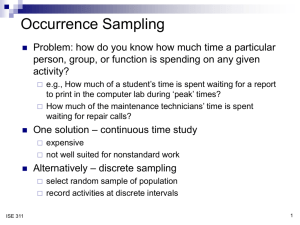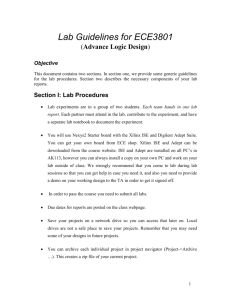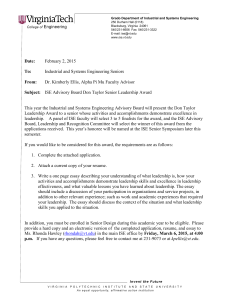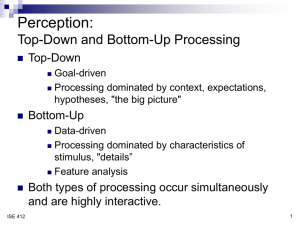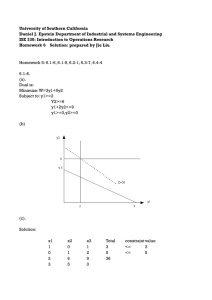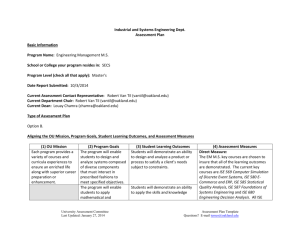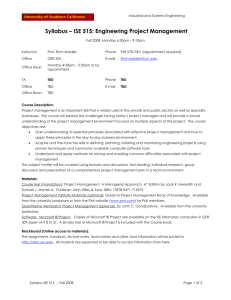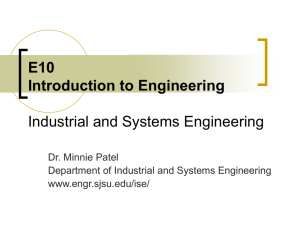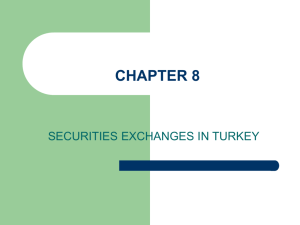Operations Analysis
advertisement
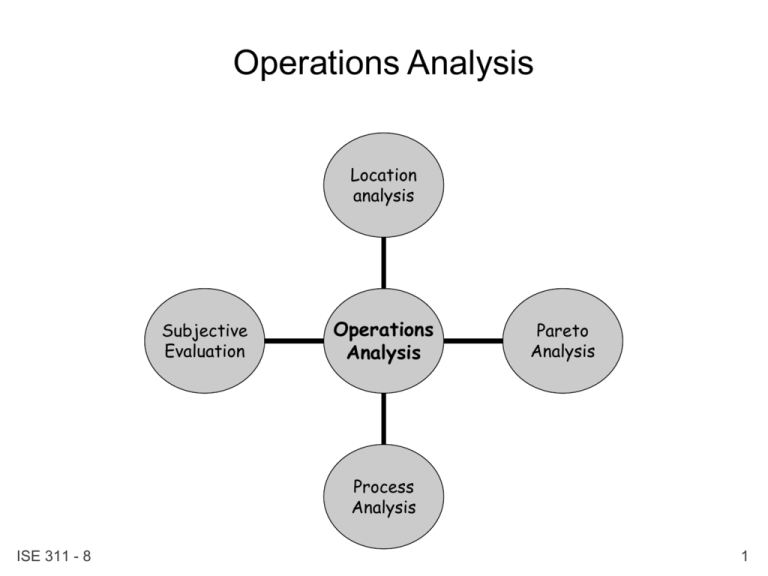
Operations Analysis Location analysis Subjective Evaluation Operations Analysis Pareto Analysis Process Analysis ISE 311 - 8 1 Location Analysis • Location of One Item Example: Locating printer, scanner, & copier station in a department. B 2 1 4 3 5 A • Systematic Layout of Multiple Items See pp. 114-117 ISE 311 - 8 2 Pareto Analysis: ‘Fight the Giants’ • Concept – bulk of the problems (opportunities) are concentrated in a few items “Fight the Giants” • Example: causes of long wait times at a health clinic (data attached.) Pareto Diagram Cumulative % of Totall 100 90 80 70 60 50 40 30 20 10 0 0 5 10 15 20 25 Cause of Waiting ISE 311 - 8 3 Process Analysis • • • • Overview of the process Identify opportunities for improvement Useful communication tool Major types Process chart • single object / person (Ergo disk) • assembly process • multi-activity chart (Ergo disk) ISE 311 - 8 Flow diagram (Ergo disk, Visio) Fish (Ishikawa) diagram (Visio) Decision structure table 4 Process chart • Symbology • Details time, distance SEARCH notes • Documentation • Example – preparing a form letter for mailing ISE 311 - 8 see next page 5 In Ergo … ISE 311 - 8 6 Flow Diagram • Usually combined with process chart to visualize physical space. • Example: Preparation and gathering for a design team meeting. (See next page.) ISE 311 - 8 7 3 4 1 4 1 1 5 4 5 6 6 2 2 1 1 3 1 3 1 6 Flow diagram of design team meeting (Visio) ISE 311 - 8 8 Other process charts • Assembly process charts show relationships among components, how several processes interact useful for methods analysis identify delays, storage problems example, pg. 121 • Multi-activity chart ‘gang chart’, ‘man-machine’ chart, ‘left-hand right hand’ chart common, scaled time axis • identify idle time, unbalanced operations • opportunities for – job sharing – double tooling – kitting ISE 311 - 8 examples, pg. 123 9 Fish Diagrams • aka, Ishikawa diagram, Cause & Effect diagram • Useful for brainstorming, identify opportunities to improve • ‘Head’ of the fish is the problem or desired effect • ‘Skeleton’ identifies potential causes ISE 311 - 8 4 M’s – manpower, machines, methods, materials 4 P’s – policies, procedures, people, plant 10 Example • Improve design team meeting productivity ISE 311 - 8 11 Subjective Evaluation • Borg Vote – Rating of Perceived Exertion (RPE) ISE 311 - 8 multiply by 10 to estimate heart rate. 6 7 8 9 10 Very, very light 11 12 13 Fairly light 14 15 16 17 18 19 20 Hard Very light Somewhat hard Very hard How you feel when lying in bed or sitting in a chair relaxed. Little or no effort. Target range: How you should feel with exercise or activity How you felt with the hardest work you have ever done. Very, very hard Don't work this hard! 12 Subjective Evaluation • Body discomfort map ISE 311 - 8 Body portions 13 Body Discomfort Scales • Borg 0 0.5 1 2 3 4 5 6 7 8 9 10 • ISE 311 - 8 Nothing at all Extremely weak Very weak Weak Moderate Strong Very strong Extremely strong Maximal • Discomfort scale Comfort 1 2 3 4 5 6 7 8 Discomfort 9 • Category partitioning • See table 9.9, pg. 126 14 Relative and Absolute Scales • Semantic differential (absolute scale) Rate aspects of the workspace, methods, etc. on a scale between 2 opposite adjectives, e.g. comfortable ___ : ___ : ___ : ___ : ___ : ___ : ___ uncomfortable spacious ___ : ___ : ___ : ___ : ___ : ___ : ___ cramped • Alternatively, choose one adjective (acceptable, comfortable, etc.) and evaluate several aspects of the workplace, methods, etc. on that one objective e.g., acceptability, comfort, etc. ISE 311 - 8 15 Relative and Absolute Scales • Paired votes (relative) Compare two alternatives on a relative ranking scale, e.g. Visibility of two different computer monitors Choose A or B Indicate degree of preference 10 ISE 311 - 8 absolutely better 9 8 significantly better 7 6 much better 5 4 somewhat better 3 2 equal to 1 16 Related Concepts • Evolutionary Operation of Processes (EVOP) Designed series of experiments to evaluate the effects on the output of the process of changing specific variables Key idea is to make changes while the process is active (i.e., not as a separate experiment) Substitute number of runs for strict control • Project scheduling ISE 311 - 8 CPM PERT 17
